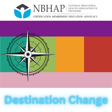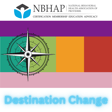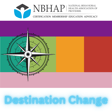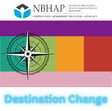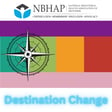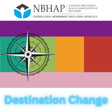Introduction to the Podcast and Guest
00:00:12
Speaker
Welcome to Destination Change, a podcast where we talk recovery, treatment, and more. I'm your host, Angie Fiedler Sutton, with the National Behavioral Health Association providers, and I use she, her pronouns. Our guest today is Dr. David Best.
00:00:24
Speaker
Dr. Best is Professor and Director of the Center for Addiction Recovery Research, CAR, at Leeds Trinity University, Honorary Professor of Regulation and Global Governance at the Australian National University, Adject Associate Professor of Addiction Science at Monash University in Melbourne, and Affiliate Senior Scientist at the Public Health Institute in California.
00:00:43
Speaker
He is also a founding member of the College of Lived Experience Recovery Organizations in the UK and of the Inclusive Recovery Cities Movement, where he is Chair of Inclusive Recovery Cities UK.
Dr. Best's Personal and Academic Background
00:00:52
Speaker
Trained as a psychologist and criminologist, he has worked in practice, research and policy in the areas of addiction recovery and rehabilitation of offenders.
00:00:59
Speaker
He has co-authored or co-edited seven books on addiction recovery and Desistance from Offending and has written more than 240 peer-reviewed journal publications and around 70 book chapters and technical reports.
00:01:10
Speaker
As of December 2024, he has an age index of 44 and a total of 7,005 citations of his academic work. He is one of the leading academics in the area of addiction recovery and a key innovator in developing recovery capital measurement tools and methods.
00:01:24
Speaker
Thank you for joining us today, David. My pleasure, Angie. yeah First of all, how do you have time to do anything with all those educational? I'm very, very old, so I have plenty of time to accrue them all.
00:01:39
Speaker
ah No, my first question is always, I like to hear what I call origin stories, just kind of how you got into the recovery space, why that versus all the other job choices that are out there, what drew you to it kind of thing.
00:01:53
Speaker
Okay, so I'll start with my own personal origin story, which is my father was an alcoholic, so I was brought up in an alcoholic household. My family is Scots-Irish, so there was no shortage of alcohol problems.
00:02:07
Speaker
In my, I guess, mid-late teenage years, Heroin hit Glasgow, my home city, and had a devastating effect. to me it The combination of Thatcher government in the UK plus the advent of heroin really did fundamentally change the world I grew up in, I guess.
00:02:29
Speaker
So that's kind of the background. When I was starting my PhD, I was really lucky So I did my undergraduate degree in psychology and philosophy, and I did my master's in criminology.
00:02:42
Speaker
When I started my PhD, I was very, very fortunate to have as a supervisor a man called John Booth Davis, who whose work is sadly overlooked a little bit now, who wrote an incredible book called The Myth of Addiction, which was about addiction as a kind of social construct. And it was a wonderfully thoughtful book.
00:03:04
Speaker
um He really was the first of a number of inspiring mentors I had. So, you know, he guided my early career. And and from there, I then moved from a kind of very academic theoretical department to a massive London teaching hospital. So I then spent the next 10 years or so working in specialist treatment services in a methadone maintenance clinic in a inpatient heroin detox ward, an alcohol detox ward that really was a great training and a great experience and seeing the lived experience of people day to day trying to navigate and negotiate drug and alcohol problems.
Understanding Recovery Capital
00:03:51
Speaker
That sounds very good. I know you're really you're big on recovery capital and that's something that kind of we it part of the reason we started this podcast was to talk about it. For those who may not know what exactly that is, kind of give me the elevator pitch of what recovery capital is.
00:04:05
Speaker
Yeah, so the the elevator pitch is it's the sum of internal and external resources available to a person to support their recovery journey. the There are two big changes from traditional treatment models in that definition.
00:04:22
Speaker
One, it's a focus on strengths, not deficits. Secondly, it's not all about what's inside the person. The external resources applies to things like your social network, your ability to access resources in the community you live in. So things like recovery groups, but also things like adequate housing, jobs.
00:04:43
Speaker
ah clubs, neighbourhood resources of all kinds. So for me, one of the big things is it stops the treatment focus of all about the individual and the pathologised brain and body.
00:04:56
Speaker
And it stops all the models about just look at what's wrong with somebody and try and fix them to much more socially community focused solutions that are based on strengths.
00:05:08
Speaker
And how did this kind of come about as as a process? I mean, you said it's somewhat fairly new. What what kind of was the inspiration for it? Yeah, so look, I think you'd probably want to credit three people.
00:05:22
Speaker
There are two academics, William Cloud and Bob Granfield, who really came up with the idea of of recovery capital. And anyone who's interested in this would do well to read their book, Coming Clean,
00:05:36
Speaker
which really is about the recovery stories of 44 what you might call middle class addicts who never went near a 12 step meeting and never went near a treatment service. And it's about their how they managed to do that journey on their own.
00:05:51
Speaker
And really deriving from that came the idea of recovery capital.
Measuring Recovery Capital
00:05:56
Speaker
But you really can't talk about anything of the history of recovery and recovery science without talking about William White, currently a resident of Florida, but whose seminal work across charting the history of recovery, advocacy, policy, work and research has been just fundamental. So...
00:06:17
Speaker
I was very fortunate, going back about, I don't know, 15 years or so, I was the chair of the Scottish Drugs Recovery Consortium and William White came to speak at the Scottish Parliament building in Edinburgh and I heard him speak and it was a fundamental transformational experience for me and it really did set me on a course away from doing traditional addiction medicine, addiction addiction science,
00:06:44
Speaker
into recovery and strength based focus. And they would really be the three figures. And and where i fit into the story is that along with a colleague of William White's called Alexandra Lode, who was ah an academic in New York, we He started saying, well, this is a great concept, but it could also be operationalized and turned into something you count and you measure.
00:07:07
Speaker
And really, over the period from about 2010 to now, the vast majority of my career has really been devoted to how do you count recovery capital?
00:07:18
Speaker
And how do you make it work? How do you make it work as something that people themselves own as part of their journey? It's not like a diagnostic. It's not like we say, you know, Angie, this is the problem you've got, and I as the expert will fix it.
00:07:35
Speaker
There's a fundamental philosophical shift, which is about here are the strengths you've got. Here are the barriers to your recovery. what are you going to What do you want and how can I help you achieve your goals that you will self-determine your way towards?
00:07:50
Speaker
There's no magic bullets, no expert solutions. This is about you, not about me. Now, I know the industry, for better for worse, is very data-driven. How do you kind of, I guess this is the wrong way to say it, but prove that it works?
00:08:03
Speaker
Yeah, I mean, it's a good question. And I think one of the problems we had was what when i I first moved to Australia, i don't know, about 15 years ago, 10, 15 years ago, and people were very dismissive of recovery on the grounds of it's all about God, it's all about wishful thinking, it's nonsense, it's not scientific.
00:08:25
Speaker
Translating recovery capital into measurements and metrics, while remarkably boring for most people, gave us a method of scientifically testing hypothesis and approaches.
00:08:37
Speaker
And look, you know, the the the happy culmination of this story is in the last edition of ASAM, the American Society of Addiction Medicine, recovery capital is now in there as a recognised valid metric.
00:08:52
Speaker
And it's so important because what it does is it allows us to say recovery is not something vague, spurious. We can count how it happens, who it happens for, over course of what course of time and what helps with that process. so So just to give you an example from my own work,
00:09:13
Speaker
I do a lot of work in recovery residences in America. And in Virginia, we were able to show that people who have very low levels of recovery capital and admission, if they're given enhanced support, so they're given extra coaching, they're given financial assistance, they're given transportation assistance, they can catch up with everybody else in a relatively short space of time.
00:09:38
Speaker
So it's important to say to policymakers, Look, this is not only something that provides you with scores about people, it's changeable.
Significance of Conferences and Community Models
00:09:48
Speaker
If you provide the right kind of support, this is something you can see grow and develop over time.
00:09:54
Speaker
So there are a couple of things. you know We start by saying it gives us the foundation for a science of recovery, but it also gives us a foundation for saying how well does Program X work and what could we do to make Program X better?
00:10:08
Speaker
So it provides a way of us ah like of starting to say, well, we use it for quality improvement right across the recovery field. And next month, we're going to start using recovery capital measurement in RCOs in Michigan. Why?
00:10:25
Speaker
Well, partly to to allow them to scientifically improve the services they deliver to their ah participants and the people who use their services. And that seems to me like ah such an important goal.
00:10:37
Speaker
But the flip side of that or the byproduct of that is among people who fund services, it gives them confidence that funding recovery services isn't just being nice to addicts, it's doing something that's genuinely credible and scientifically meaningful.
00:10:54
Speaker
Now, this is where I promote the fact that you were at our National Recovery Capital Conference. I think it was last year. Time is lost on meaning. Last year in 2024, yes, I was. In September in Los Angeles.
00:11:08
Speaker
Yes, we have this. It's now been, I think it'll be three years this year as part of CCAT's California Addiction Conference. Please go to the BHAP website for more, mbhap.org. I got to listen to you for about five minutes before I had to go run off and take care of it. That's about as much as most people can stand of listening to me.
00:11:28
Speaker
um No, you were great when I could hear. I wish I could have stayed more. Talk a little bit more about, you know, obviously you talk about recovery capital. Do you cover other topics when you when you do presentations?
00:11:40
Speaker
Yeah. Yeah. So one of the big things for me and um in my work is about the idea of recovery communities and measuring inclusive recovery cities. So in the UK and now increasingly internationally, we've developed that model of recovery to say, well, you don't just count recovery capital at the level of an individual.
00:12:00
Speaker
You can measure at the level of a social network or a community. And so we've launched the idea of inclusive recovery cities and we now have 32 of these cities, which is about challenging stigma, creating connections and communities for people in recovery, building up access to volunteer and employment opportunities by celebrating recovery and by promoting the idea that people in long term recovery actively contribute to the wellbeing of their communities.
00:12:31
Speaker
And this for me is a really important social movement about saying, you know, it's a long term journey to recovery, but when people get there, it has significant benefits, not just for them, but for their family and for their community.
00:12:46
Speaker
And I think one of the things that's a complicated concept for people is recovery is ah is both a social contagion. So it primarily spreads from one person in recovery to another.
00:12:59
Speaker
But it's also like dropping a pebble in a pond because it's not just the person in recovery who benefits. There's a ripple effect out to the family, to the neighbourhood, to the community.
00:13:11
Speaker
it's Its value is additive. But when people actively and openly promote their own recovery well-being, they create well-being in the communities they live in Now, you are obviously well-traveled. You talked about being in Australia. You're obviously not American, but you talked about Virginia and you've you've been in California.
00:13:33
Speaker
I'm sure there's a lot of differences and but also ah similarities between, you know, non-American addiction treatment and and American. What would you say is like some of the hurdles you have to travel when you are going from one to the other?
00:13:47
Speaker
Yeah, so look, I mean, I guess one of the fundamental differences is in the yeah UK and Australia, we basically have a publicly funded addiction treatment system. So there's no health insurance component other than from a very small number of people who access private health.
00:14:04
Speaker
um But there are many of the same barriers. And the sad thing is there are locality differences in recovery capital ah based on the availability of recovery groups, of visible recovery champions, all of stigma and barriers to recovery. But also within those communities, there are variations by gender, by ethnicity, by culture.
00:14:28
Speaker
One of the places I've had the pleasure of working is New Zealand. And in New Zealand, there is a ah wonderful attempt at creating drug courts that are focused almost entirely on the Maori and Pacifica populations.
00:14:46
Speaker
So the artwork kid in the court is all Maori artwork. They have a cultural advisor called a poweranga. who re-engages people with their cultural identities and roots.
00:14:59
Speaker
The whole court at the start of each session sings the serenity prayer in Maori, including the judge. It's a phenomenal experience. Now, none of which changes. The recovery journey is different and probably more difficult for Maori men than for white New Zealand men.
00:15:16
Speaker
The other thing I think is so important to say about this is Over the course of my career, I've collected about 4,000 recovery stories. And increasingly, it's apparent to me that men and women recover in completely different ways.
00:15:31
Speaker
They will frequently use similar tools to recover, but their pathways and their trajectories tend to be fundamentally different. And when we talk about recovery, we are talking about a complex ah mix of of solutions and and pathways that vary by location, context, gender, ethnicity, culture, sexuality, social identity.
00:15:57
Speaker
All of these things potentially create slight variations and in the pathway. And so we would never have universal medical type rules because it's so bound up in who you are and what communities you live
Changing Substance Profiles and Treatment Challenges
00:16:12
Speaker
One of the things we've we've talked about and on this podcast before is the fact that recovery is a journey, not a you know not a straight line that you can go back and that it is different for pretty much everybody. what are some ah you know You've obviously been in the industry for a while. What would you say are some of the biggest changes that you've noticed?
00:16:30
Speaker
Yeah, I mean, I think for me, some things have changed phenomenally and some things haven't changed so much. The profile of what substances people use have changed. So when I worked in the field, as saying when I started in the field, essentially you had two groups of people.
00:16:47
Speaker
You had ah problem drinkers and you had heroin addicts. They were the two groups of people. And that's now become much, much more diafect diversified.
00:16:57
Speaker
Our understanding of of our delivery of treatment, I don't think, has improved massively. ah In the UK, in Australia, and sadly, I suspect in parts of America, the quality of specialist professional drug and alcohol treatment is pretty low.
00:17:13
Speaker
There's an over-reliance on pharmacotherapies, providing people with medications. And the quality of delivery of talking therapies is poor. And we still have a belief in magic bullets that if we can just get this treatment a little bit better, everything will be fine.
00:17:29
Speaker
And as you you yourself said, recovery is a five-year journey at least. We need pathways, not miracle cures. We need models that are around jobs, friends, and houses.
00:17:41
Speaker
Or if you want to phrase it, somewhere to live, someone to love, and something to do. I think sadly the vested entrenched beneficiaries of the addiction industry have meant not not enough has changed. Yes, lots of things have.
00:17:56
Speaker
The populations have, the problem profiles have, the complexity of of things like addiction, sex addiction, social media addiction, they have all become much more salient and prominent in our models.
00:18:10
Speaker
But the quality of what we typically offer is treatment. I don't think that's really progressed anywhere near at the same extent. I think there are far too many people make careers out of the addiction industry without really offering anything innovative or new.
00:18:25
Speaker
Sorry if you weren't expecting that kind of negative response. No, no, I leave my mind open because, know, we can always grow is my
Stigma, Justice, and Future Advancements
00:18:34
Speaker
big thing. But speaking, you know, you've mentioned stigma, you've mentioned the cost, especially in America, as barriers for treatment. Would you say some of those barriers have changed at all in the years or they still the same or there new ones? No, no,
00:18:47
Speaker
I think one of the things we are starting to see with recovery is a very slow, diminishing stigmatisation of people in recovery. I think the simplistic notion of recovery as a exclusively abstinence based thing has ah gradually eroded.
00:19:05
Speaker
I think the openness of the fellowships to different approaches and being part of partnerships has changed. It seems to me that increase it is in the US, as in the UK, some really innovative interventions happen in the justice system. So I've had the pleasure of working in in ah jail, Chesterfield jail County jail in Virginia.
00:19:30
Speaker
I currently work in HMP Liverpool in the UK, which is the first inclusive recovery prison we have in the UK, which is a transition to a strength-based model for delivering treatment and recovery support in prison and then when people leave prison. So I can see some significant challenges to that very punitive model.
00:19:53
Speaker
And I think there are grounds for optimism there. i think the days of especially injustice of effectively offering people either punishment or some very limited form of treatment is beginning to diminish.
00:20:07
Speaker
And we are seeing some improvements there. Well, that actually leads me directly into my next question. So thank you very much. yeah Where do you kind of see the industry going in the next you know few years? Where where do you you know what kind of things do you see coming up?
00:20:22
Speaker
Well, it seems to me like among the areas that we are starting to understand much better is the need for much, much stronger family systems model and family based recovery approaches. That for me is fundamental. It seems to me the notion that you're treating only the individual is flawed.
00:20:42
Speaker
I've seen some wonderful enhancements and developments in recovery housing models, especially in the United States, which have done through the work of NAR and its affiliates really have grown spectacularly.
00:20:54
Speaker
um I think we're going to see the same kind of things happening with RCOs over the coming years. So it seems to me that The other thing I think we'll start to see is recovery being regarded as a form of prevention and early intervention. that Instead of seeing addiction and addiction systems as a straight line, we start to see it as much more of a cycle where effective community recovery becomes a form of prevention and early intervention.
00:21:21
Speaker
Another plug for be behalf, you mentioned NAR, Dave Sheridan, who is the president, I think is his official. Yeah, I think he's got some very bland title, whatever it is. yeah He was on episode three of this podcast. So if you're new to the podcast, please go back and listen to him and you can listen, learn more about recovery residences.
00:21:38
Speaker
ah Let's talk a little bit about your books. We have the Recovery Capital Handbook will be published by Bristol University Press. We have been very fortunate that most of the significant figures who have researched or worked in the area of recovery capital written this. So the preface and one of the early chapters are written by William White.
00:21:59
Speaker
ah Robert Granfield and William Cloud write another chapter. We have covered Many of the conceptual practical components is an edited book, so I would have had the pleasure of working with my friend and colleague, Dr. Emily Hennessy from Harvard Medical School.
00:22:16
Speaker
We are the co-editors of this book. I feel for me, what I've been in the fortunate position to do is to showcase the advances in recovery capital science over the course of 25 years.
00:22:28
Speaker
And really the steps in that 25-year period have been ah phenomenal. And that i I think of all the books I've written, it's the one that's given me the greatest pleasure because I've been able to watch and support the nurturance of this as an area of growth.
00:22:46
Speaker
And I think one of the things it leads us to is to starting to think about if we're serious about helping people build recovery capital, we have to think about how do we create the conditions in treatment services, in housing projects, in community settings that maximise the chances of them achieving that recovery, that provide people with the resources and supports they need.
Peer Support and Recovery Research
00:23:12
Speaker
And I think this is an incredibly positive and exciting journey for us. The other big area for me is around helping people overcome crime careers and criminal careers.
00:23:23
Speaker
So the other big, big part of my world is around supporting pathways to change. So you mentioned in my bio or that I've been involved in something called CLEARO. We set up something in the UK during COVID called the College of Lived Experience Recovery Organisations.
00:23:41
Speaker
And that has been to build up the infrastructure for peer support. And whether we're talking about rehabilitation of offenders or recovery from substance use, that there has been a massive understatement and underfunding of peer delivered projects and peer science.
00:24:00
Speaker
And so for me, the other massive area is to look at the role of peer mentoring, peer development and how to create and support those peer champions that act as the catalyst for change for people. So that would be my other area, rehabilitation of offenders and the increasingly prominent role of peers in that process.
00:24:23
Speaker
Now, you're also the director of Center for Recovery Research. how This sounds like a basic question, but how do you research addiction recovery? You know, what are what some of the things that you look at? Yeah. So the kind of things we look at are the patterns and prevalence of recovery.
00:24:39
Speaker
So the but the basic questions for us are that there's standard science questions about who recovers and why. But then much more importantly in my work is how do we map innovation and recovery and how do we create a science that allows us to see what works and how would you replicate it somewhere else? Because one of the challenges of recovery is that the science is way behind the innovation. I'm sure you could list all kinds of local innovative recovery projects and activities. So, Nirmeen, I am fortunate enough to be on the advisory committee of a wonderful organisation called Getting Clean.
00:25:18
Speaker
And Getting Clean makes soap. And that's that's why they're called Getting Clean. LAUGHTER They make soap with hope and they fight crime and grime one bar at a time. Now, this is a social enterprise that offers people jobs.
00:25:35
Speaker
They run workshops in prisons. they They sell soap. They run community activities. But it's a fabulous, innovative idea ah about how you champion recovery.
00:25:47
Speaker
How do we scientifically assess that? And how do we work out how that could be replicated in other places? Well, that's exactly the kind of thing we do. And as I've said to you, i mean, a significant proportion of my work now involves the criminal justice system.
00:26:04
Speaker
So I spend a lot of time doing work with halfway houses where we are currently training peer workers to champion and support people into pro-social activities when they're released from prison.
00:26:19
Speaker
And an awful lot of my work is about measurement tools. How do we more consistently and effectively measure where people are and to create the tools and interventions? Because one of the things that I have found incredibly frustrating is there's an assumption that recovery coaching is a kind of dumbed down, watered down version of therapy.
00:26:40
Speaker
It's like motivational interviewing for dummies or CBT for dummies. And it seems to me we need to have much more commitment to the idea of parity of esteem, that people in long-term recovery have not like a weaker version of professional skills, but equivalent skills in different areas, and they are the areas we need to be training and working
Balancing Policy and Practice
00:27:03
Speaker
Well, that kind of definitely that leads me into my next question. So again, thank you. You work on policy and you're talking about criminal as with the treatment. I'm sure it's you know, there's some vast differences between policy and advocacy from in the US versus the UK. And just because the different governmental systems talk a little bit about your work there.
00:27:20
Speaker
Yeah. so Look, for me, I think one of the massive challenges has been to recognise, and I don't think this is a difference between the US and the UK, and I see it a little bit with NAR, there's a growing recognition among policy makers that without a balance between treatment and recovery, the treatment efforts are to some extent wasted because people will simply be on a revolving door cycle in and out of specialist treatments.
00:27:47
Speaker
Unless you have community-based services that can act as a form of early intervention, prevention, as well as aftercare, treatment efforts are frequently wasted.
00:27:58
Speaker
So much of the, I think much of the policy efforts I engage in, not just in the UK or the US, but internationally are really about saying, how do we create an evidence base that shows that recovery support works?
00:28:11
Speaker
and that you should fund much, much more of it. That effectively, that there needs to be both a bigger pie of funding, but that larger slice of that pie goes to recovery support services.
Advice and Resources for Newcomers
00:28:22
Speaker
That sounds great. If you could travel back in time to when you were first starting out in the industry, what would the so be the advice that you'd give yourself? What's the one thing you've learned? Don't be so adversarial. I think for me, I spent far too much of my time involved in the recovery versus harm reduction wars.
00:28:40
Speaker
And as i have as I have aged and hopefully mellowed a little bit, I've become increasingly aware that many of those battles were false wars and that recovery and harm reduction are parts of the same process of change over time.
00:28:55
Speaker
And that, you know, the work on things like nalopso and substitute prescribing, safer injecting rooms, needle exchanges are all essential for people at stage in their recovery journey and that we should not regard any of this as an either or.
00:29:12
Speaker
And that if we end up, continue with, the as goes on in, say, in bits of Canada and Australia, with this kind of harm reduction versus abstinence to debate, we are really doing nothing but harming the people we're trying to help.
00:29:25
Speaker
And similar, if someone was new to the industry or wanting to get into the industry, what kind of advice would you, and they came to you for advice, what would you tell them? Well, I'll be disloyal as a university academic and say, don't spend time with academics. get ah Get out and don't spend time in treatment centres.
00:29:45
Speaker
Get out and and go and go to recovery celebration events, to 12-step graduations, to recovery community activities. Get out there and meet people in recovery because it is fundamentally enhancing to your spiritual wellbeing and your quality of life.
00:30:04
Speaker
but The stories of recovery and watching the redemption of people in recovery – is incredibly life for fireman. I know we kind of covered this in the first question, but I always like to ask kind of off the cuff, why do you do it? Why do you do what you do?
00:30:20
Speaker
um do I do believe that if people are given the chance to turn their right lives around and the circumstances are available, they will not only get back to where they started, they will do much, much better. And I love the idea of transforming our science from saying we will take people's illnesses away from them to supporting and enhancing people to live their best life and to be better than well.
00:30:48
Speaker
And I think observing that process is such an incredible thing. My father never achieved recovery. And i I watch it happen in other people with a sense of wonder and optimism and pride.
00:31:03
Speaker
Yeah. Now, you're obviously the yeah one of the experts on recovery capital. What kind of resources would you recommend people go to if they wanted to learn more about it? If they're interested in the academic side, there's a wonderful institution called the Recovery Research Institute, RRI, which is available online. And they have all kinds of resources on the Chestnut Health System website. You will find William White Papers,
00:31:30
Speaker
which is just a remarkable reserve of resources. The other place which I'm sure lots of people will say to you is go to the SAMHSA website, the Substance Abuse Mental Health Services Administration website.
00:31:43
Speaker
And really, i would I would strongly suggest delve into what's available locally to you. but Virtually every area in the United States has an astonishing reserve. I mean, go via NAR, look at some of the 12-step literature.
00:31:59
Speaker
There's an like an incredible abundance of recovery things. And if you're interested in recovery capital, my own website is called Cultivating Recovery Capital. So there are there are huge resources out there.
00:32:11
Speaker
And I think do a bit digging what's local and get involved. Volunteer, get involved in your local recovery celebrations, activities, graduations and events because it's incredibly rewarding.
00:32:24
Speaker
If people want to learn more about you, where can they find other than your website? As I said, my website is Cultivated Recovery Capital. If they go on to the Leeds Trinity University website, they'll find me under the Center for Addiction Recovery Research, or they can just Google me.
00:32:41
Speaker
If you Google me, you'll find various of my talks and presentations. And Angie, you have my email address. If anyone really wants to communicate with me, I'd be more than happy for you to pass out my email address to people.
00:32:54
Speaker
Now, was there anything that you wanted to talk about, but we haven't, or that you thought I was going to ask, but we didn't? I think you've covered everything very well, so that has been ah it's been a pleasure to talk to you.
00:33:04
Speaker
Awesome. You've been listening to Destination Change. Our guest today was David Best. Thanks to you for being here. Our theme song was Sun Nation by Kitsa and used via Creative Commons license by the Free Music Archive. Please consider rating and reviewing the podcast on Apple Podcasts we can get more listeners.
00:33:19
Speaker
In the meantime, you can always see more about the podcast, including show notes and where else to listen, on a website, www.NBHAP.org. If you have any questions for the podcast, please email us at info at NBHAP.org.
00:33:32
Speaker
Thanks for listening.

